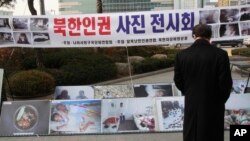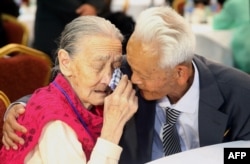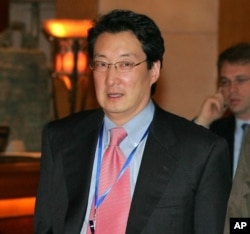The announced talks between U.S. President Donald Trump and North Korean leader Kim Jong Un have been broadly welcomed following years of tension over the North's nuclear weapons and missile programs. Less clear is how such a meeting could affect human rights in North Korea, which has one of the world's most oppressive governments.
U.N. Special Rapporteur on Human Rights Tomas Ojea Quintana on Friday used the occasion of the announced talks to appeal for North Korea to also open a dialogue with the United Nations on human rights.
"I had always stressed that engagement with North Korea should never be underestimated, and also that human rights remain a priority and must not be held hostage to the security situation. In this regard, I urge the DPRK to consolidate the rapprochement with a parallel opening to U.N. human rights monitoring," he said in a report to the U.N. Human Rights Council.
The U.N. Commission of Inquiry on Human Rights in North Korea stated in 2014 that authorities there have committed crimes against humanity including murder, enslavement, torture, imprisonment, rape, forced abortions, deliberate starvation, sexual violence and enforced disappearances.
Brief reunions
Quintana also noted that family reunions — short meetings between family members who have been separated for decades by the border between North and South — have not been held since 2015 and should be resumed as soon as possible, given the age of many of those concerned.
The average age of the 59,000 people requesting a family reunion in the North is 81.
Quintana's reporting on the human rights situation in North Korea has been rejected by Pyongyang. The U.N. largely depends on interviews with North Korean defectors to learn about conditions in the country, but Quintana has been lobbying the North to engage with the U.N. on the issue.
Some critics say the meeting with a U.S. president, a first for North Korea, will bolster the reputation of a government whose rights abuses have made it an international pariah.
A presidential meeting is "a very legitimizing gesture for one of the world's most serious human rights abusers, somebody who's had relatives assassinated and executed to consolidate his regime," P.J. Crowley, U.S. assistant secretary of state for public affairs during the Obama administration, said Friday. "We've traded this meeting for perhaps a 90-day moratorium on nuclear and missile tests."
U.S. Vice President Mike Pence criticized the North Korean human rights record in February, en route to the Olympic Games on the Korean Peninsula.
'Modern-day gulags'
"As we speak, an estimated 100,000 North Korean citizens labor in modern-day gulags. ... Those who dare raise their voices in dissent are imprisoned, tortured and even murdered; their children and grandchildren [are] routinely punished for their family's sins against the state," Pence said in remarks to U.S. troops at the Yokota Air Base in Japan.
U.S. President George W. Bush's top adviser on North Korean affairs, Victor Cha, wrote Friday in The New York Times that Pence's words must not be forgotten in the rush to put Trump and Kim together in a room.
"Any summit meeting cannot allow Mr. Pence's pronouncements during the Olympics about North Korea's human rights abuses to evaporate into thin air," Cha wrote. "Indeed, engaging the regime on improving its human rights record could be an important metric of the authenticity of the North's diplomatic overtures."
And rights group Human Rights Watch wrote an open letter to the United Nations on Thursday, demanding that U.N. officials and member states in the U.N. Human Rights Commission keep the pressure on North Korea to demand "real changes" that will improve the lives of North Koreans.







